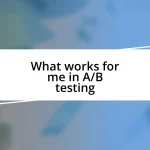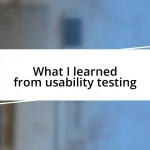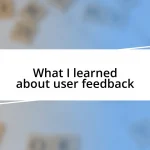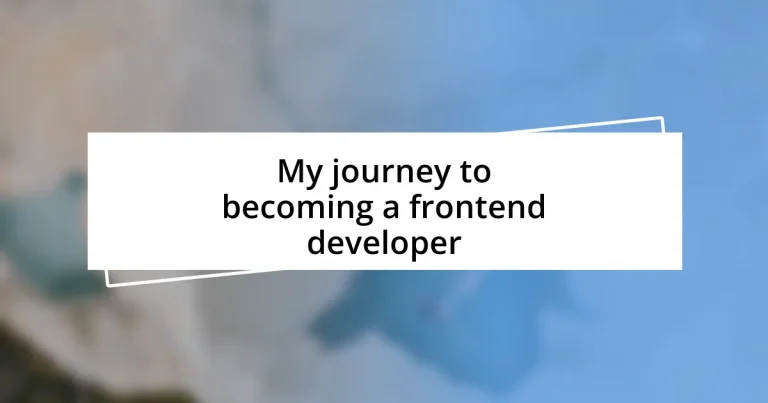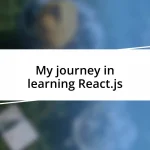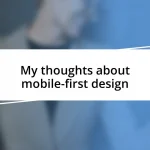Key takeaways:
- Learning foundational technologies like HTML, CSS, and JavaScript sparked a passion for creating interactive web experiences.
- Building practical projects and engaging in real-world freelance work provided invaluable hands-on experience and boosted confidence in problem-solving and adaptability.
- Continuing education and specialization in areas such as accessibility and performance optimization are essential for growth and staying relevant in frontend development.
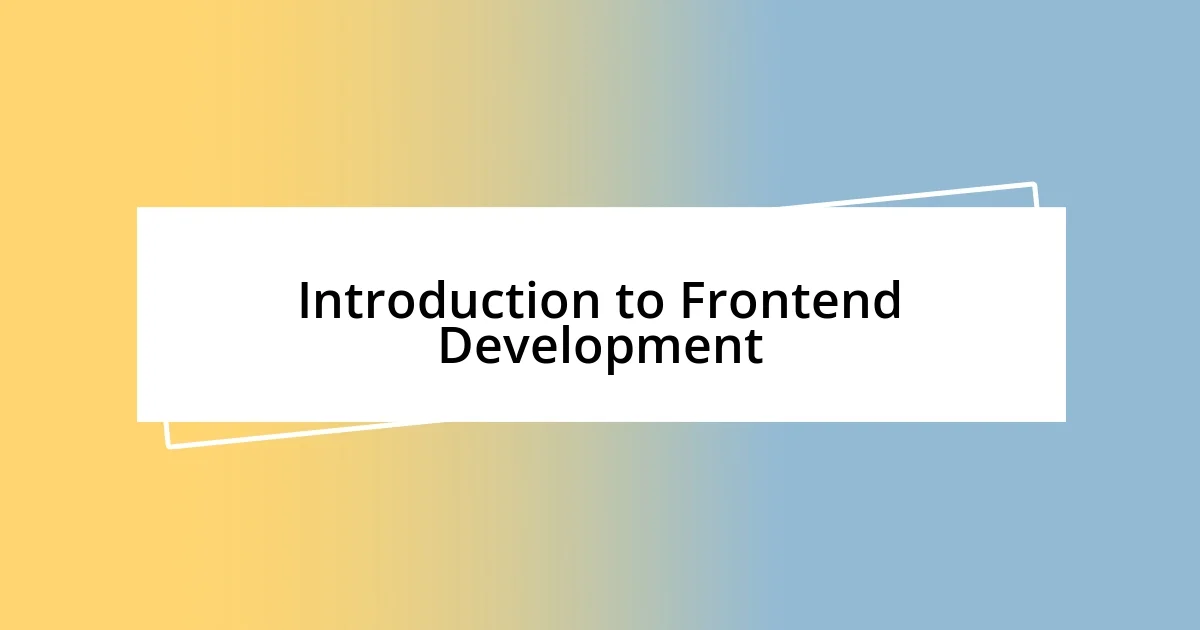
Introduction to Frontend Development
Frontend development is the art and science of creating the part of a website or application that users interact with directly. When I started my journey, I was fascinated by how a simple line of code could transform a blank screen into a vibrant, interactive interface. Have you ever wondered how those sleek buttons and smooth animations come to life?
At its core, frontend development combines design and functionality, making it crucial for the user experience. I remember my first challenge was learning HTML and CSS; the sheer satisfaction of structuring a webpage and seeing my design take shape was exhilarating. It’s like building a house where you not only lay the foundation but also paint the walls and arrange the furniture—every detail matters.
JavaScript soon joined the mix, adding interactivity and complexity to my creations. I can still recall the moment I first implemented a dynamic feature, watching it change in real-time. Isn’t it incredible how one programming language can breathe life into a static webpage? That moment solidified my passion; I realized that frontend development isn’t just about writing code—it’s about crafting experiences that resonate with people.
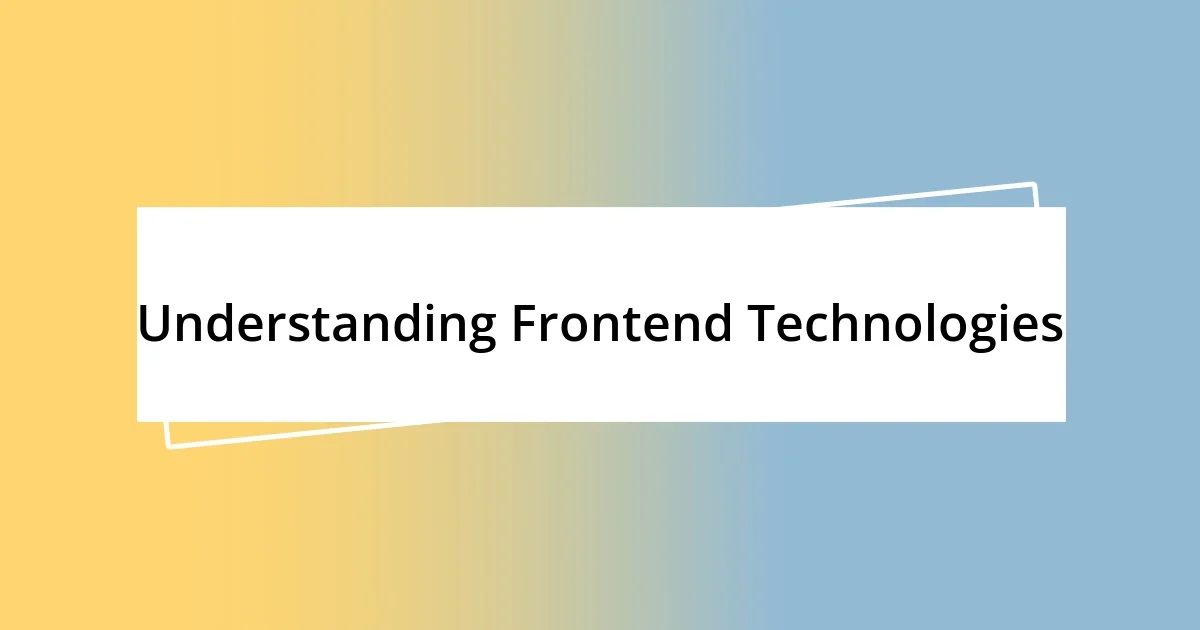
Understanding Frontend Technologies
As I delved deeper into frontend technologies, I discovered a rich ecosystem that supports development and enhances user experiences. Each technology plays a specific role, contributing to that magical journey from concept to execution. For instance, I often found myself experimenting with frameworks like React or Vue.js, which made building complex interfaces feel like a breeze. There were moments of frustration, but mastering these tools made the triumphs even sweeter.
- HTML (HyperText Markup Language): The backbone of any webpage, it structures content.
- CSS (Cascading Style Sheets): The magic wand for styling, giving life and beauty to HTML elements.
- JavaScript: The powerhouse for interactivity, allowing for real-time engagement with users.
- Frameworks (e.g., React, Angular, Vue): Tools that streamline development, offering reusable components and efficient rendering.
- Version Control (e.g., Git): Essential for collaboration, helping me manage code changes and track progress.
Navigating this landscape was like learning a new language, with each framework and tool unlocking a new level of creativity. The thrill of integrating a CSS animation to a button or refining a JavaScript function that smooths out user interactions was truly exhilarating. I still remember the rush of excitement when I saw my first fully functional application come together. That feeling of accomplishment ignited my passion even further and motivated me to continue exploring every avenue of frontend development.
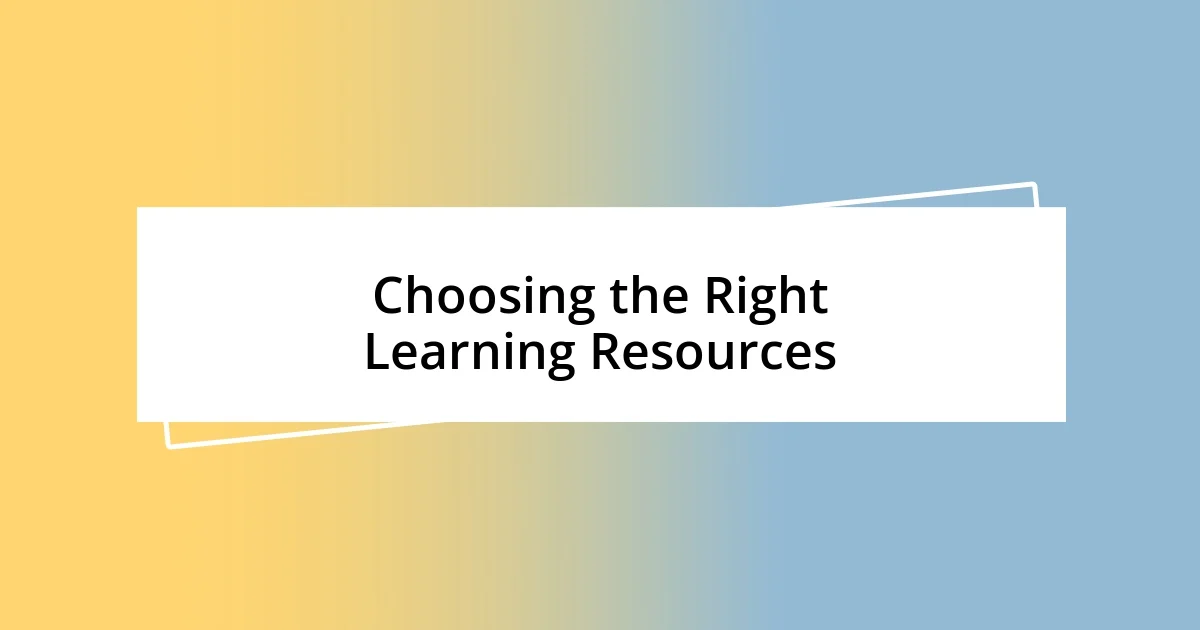
Choosing the Right Learning Resources
Choosing the right learning resources can feel like a daunting task, especially for those starting their journey in frontend development. My personal experience taught me that combining various resources is vital. I often found free online tutorials on platforms like Codecademy to be great for beginners. Yet, I also valued the more structured approach of online courses on sites like Udemy. They provided a comprehensive curriculum that I found easier to follow compared to fragmented YouTube tutorials.
I remember the excitement of following a coding bootcamp that offered real-world projects. It was a game-changer! Projects acted as both a motivator and a practical application of my skills. Engaging in hands-on work enhanced my understanding of concepts like the Document Object Model (DOM) and event-driven programming. Have you ever felt the surge of confidence after successfully completing a task? That’s what I experienced—each project felt like a steppingstone, linking my learning to practical outcomes.
When selecting resources, I also recommend checking for community support. Online forums like Stack Overflow became my go-to whenever I faced a coding roadblock. Finding a community that encourages growth can immensely impact your learning journey. Remember, the right resources not only educate you but also inspire you to keep pushing your boundaries.
| Resource Type | Advantages |
|---|---|
| Free Online Tutorials (e.g., Codecademy) | Accessible, good for beginners, quick to dive in |
| Structured Online Courses (e.g., Udemy) | Comprehensive, systematic learning, often with projects |
| Coding Bootcamps | Intensive, hands-on projects, community support |
| Online Forums (e.g., Stack Overflow) | Problem-solving assistance, networking opportunities |
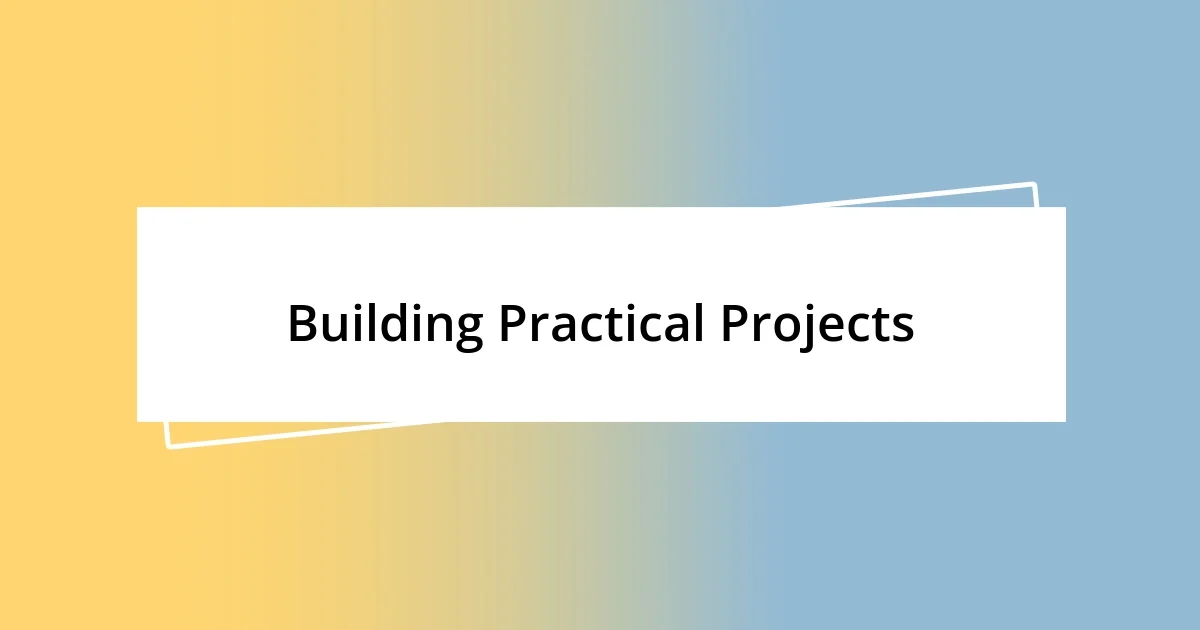
Building Practical Projects
Building practical projects was truly the heart and soul of my journey. I vividly recall the first project I tackled—a simple to-do list. It was nothing fancy, but as I coded each functionality, I felt the pieces of my learning coming together. Seeing tasks get added, checked off, and deleted in real time was exhilarating! That moment illuminated the path forward, demonstrating how my skills could translate into tangible results.
As I moved on to more complex projects, like a personal portfolio website, I grappled with the challenge of blending aesthetics and functionality. I remember wrestling with CSS positioning to make my layout mobile-responsive. However, when I finally achieved a seamless design, I was filled with pride and a sense of accomplishment I had never known before. This experience taught me that real growth often lies beyond the comfort zone. Can you think of a challenge you overcame that made you realize how far you’ve come?
Moreover, building projects not only enriched my skills but also fostered creativity. I often experimented with integrating APIs for real-time data, which felt like magic as I watched my application come alive with live weather updates or even random quotes. These experiences highlighted the importance of testing boundaries and pushing the envelope in development. Each project not only equipped me with technical know-how but also stoked my passion for exploring what’s possible.
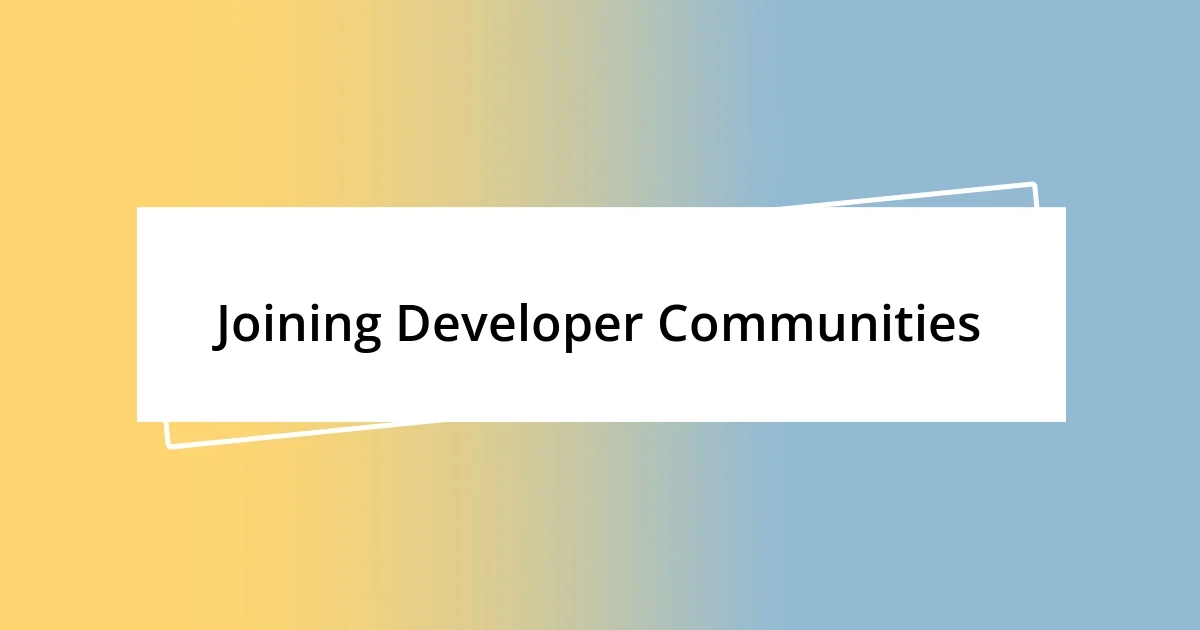
Joining Developer Communities
Connecting with developer communities was one of the most rewarding decisions I made on my journey. I remember the first time I joined an online community—suddenly, I wasn’t alone anymore. Whether it was asking questions on Reddit or engaging in discussions on Discord, I found camaraderie in learning. Have you ever felt the energy that comes from sharing ideas with like-minded individuals? For me, it was electric!
Participating in community events, like hackathons or local meetups, opened up a whole new world. I recall attending a meetup where a speaker shared his experience of transitioning from a traditional job to full-time development. His story resonated deeply with me, igniting a fire of motivation. I realized that connecting with others who share your aspirations can be incredibly inspiring. I also noticed that the support network I’d built helped me tackle challenges more effectively; sharing setbacks turned them into learning opportunities.
Online forums became my lifeline too. Each time I posted a question, I felt a wave of hope as I awaited responses. I vividly remember a contributor who not only answered my query but also shared valuable resources based on my specific coding issues. That generosity made me want to give back in kind. Think about it: What would you do to support someone facing the same hurdles you once did? For me, it became a mission to help others while continuing to learn from the wealth of knowledge within the community.
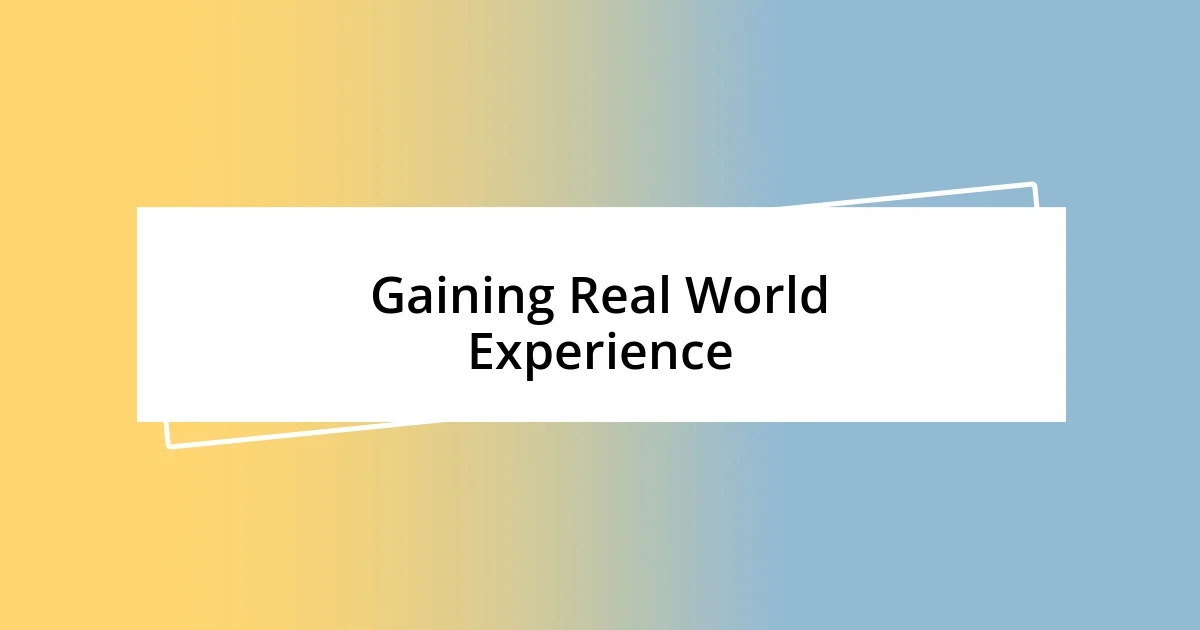
Gaining Real World Experience
Gaining real-world experience is crucial for any aspiring frontend developer. One of the most impactful moments in my journey was when I took on freelance projects. I vividly remember my first client, a small local business owner who needed a website. That initial meeting was a mix of excitement and anxiety! The challenge of translating their vision into a functional site pushed my skills—and my confidence—to new heights.
As I navigated client feedback and tight deadlines, I learned invaluable lessons in communication and adaptability. I recall an instance where the client wanted a last-minute change just a day before the deadline. My heart raced, but instead of panicking, I focused on creating a solution. It struck me then how critical it was to remain calm and solution-oriented under pressure. Have you ever faced a situation where staying cool made all the difference? For me, that experience taught me resilience in the face of challenges.
Moreover, working on real projects brought a level of accountability that simulated a professional environment. I remember using version control for the first time, feeling like a true developer! It not only enhanced my technical skills but also provided a sense of ownership over my work. Each completed project wasn’t just a learning experience; it represented my growth journey. How often do you reflect on your progress? I realized that every small step taken was a building block towards my ultimate goal of becoming a proficient frontend developer.
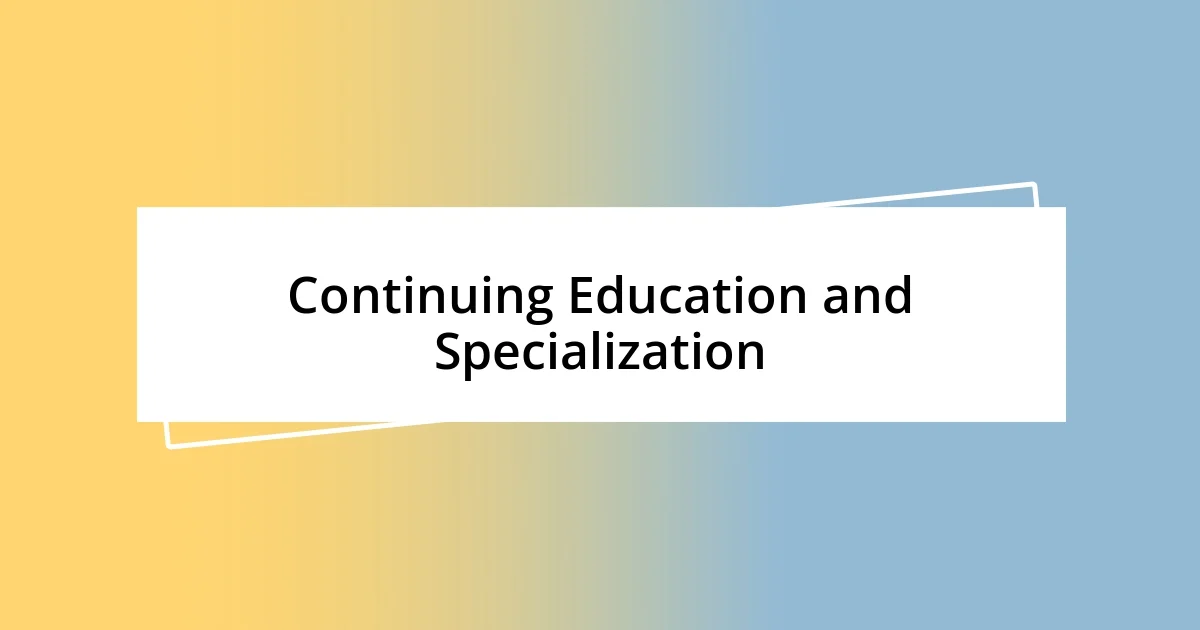
Continuing Education and Specialization
Continuing education is a vital part of my growth as a frontend developer. I remember enrolling in an online course that focused on React—my first deep dive into a framework that would revolutionize my work. Each lesson felt like peeling back layers of mystery, and I could feel the excitement building with each component I built. Have you ever felt like you just cracked the code on something you once thought was complex? That thrill is irreplaceable, and it’s moments like these that highlight the importance of continuous learning.
Specialization became my next focus. After mastering the basics, I realized that honing in on specific areas, like accessibility and performance optimization, set me apart. I recall attending a workshop on web accessibility where I learned how to ensure that everyone, including those with disabilities, could enjoy the websites I create. It was eye-opening to understand my role in making the web a more inclusive place. Reflecting on this, how often do you consider the broader impact of your work? For me, refining my skills to meet diverse user needs has become a source of pride and motivation.
Beyond structured courses, I sought out specific resources, like podcasts and blogs, to stay updated with industry trends. One day, I stumbled upon a developer’s journey that discussed their favorite libraries and tools—the insights were invaluable. Those discussions kept me engaged and curious about what’s next in the frontend landscape. I often ask myself: Am I doing enough to expand my skill set? Each new resource I encounter felt like a fresh opportunity to learn, and it reinforced my belief that education is truly a lifelong journey in tech.


